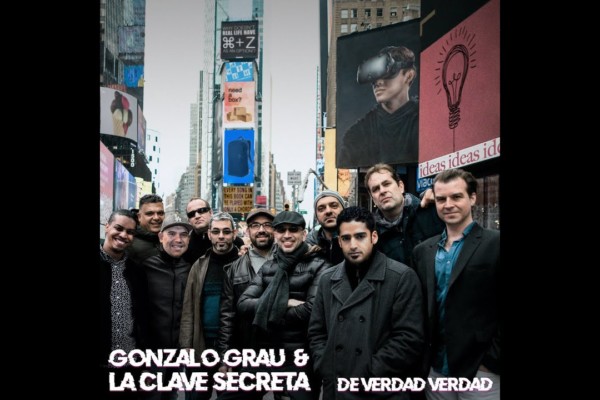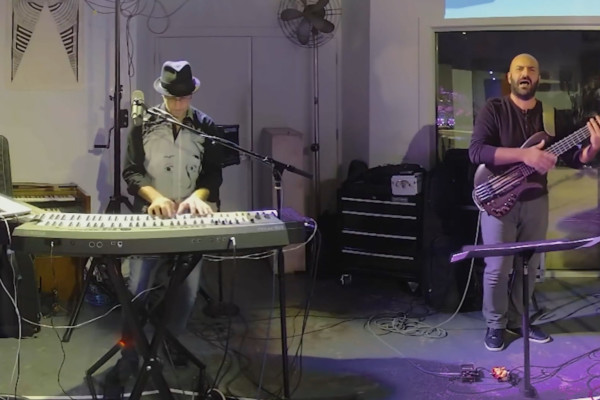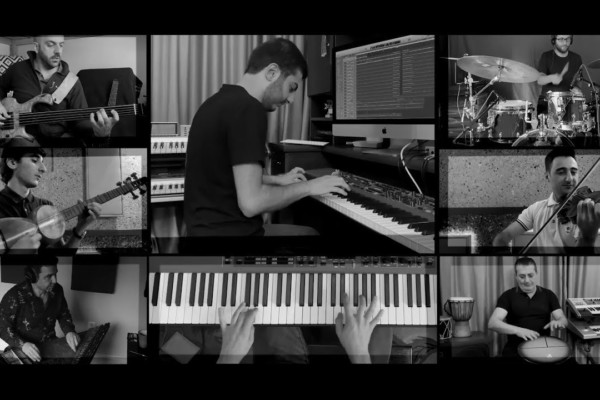Morning Bound: An Interview with Panagiotis Andreou
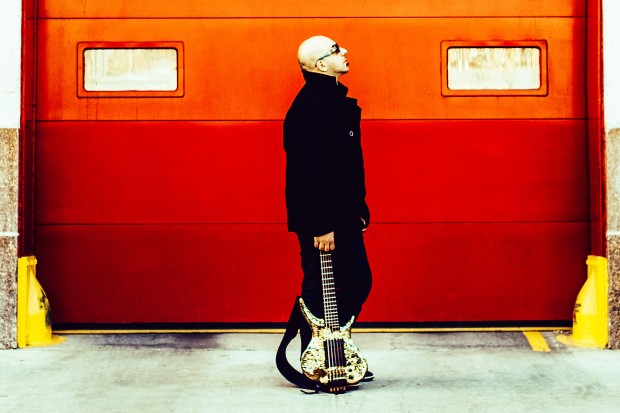
It’s easy to get wrapped up into a specific genre, but there’s a whole world of music to discover and explore. No one knows that better than bassist Panagiotis Andreou.
The Greek-born bassist is a student of all types of music, and that’s not just lip service. He’s been playing bass since he was sixteen and has studied loads of ethnic music to build his own incredible vocabulary. He studied and taught in India. He’s schooled in Balkan folk music. He’s also a master of Afro-Cuban music and was named Best “Latin Jazz Bassist of the Year” by Latin Jazz Corner.
More recently he’s been focusing on his genre-bending projects Now Vs. Now and Morning Bound, the latter of which has released a fantastic self-titled EP. Morning Bound, which also features vocalist Tammy Scheffer and drummer Ronen Itzek, first caught the attention of No Treble readers when we posted the spellbinding video for their eponymous song.
We caught up with Andreou fresh off of a tour of Africa to get his background, his thoughts on learning music, and about the new album.
You’re a very diverse musician with expertise in so many styles of music. Can you tell us some about your background?
I’ve been a New Yorker since 2002. I came to the U.S. in 1999 when I got a partial scholarship to Berklee, where I graduated in 2003. Because I went to conservatory in Athens, I belonged to the Berklee International Network. When I graduated, I came directly to New York to get a Masters in Jazz, believe it or not. I had never played it before in my life. I had played almost every other style but never that.
I was born in Athens, Greece and I grew up there. I come from a lower-middle class family in Greece that was very open minded. I was very lucky about that in comparison to other people where I grew up. People would dream of joining the public sector or getting married and having children and that kind of stuff. I was lucky because my family encouraged me to play music. I started playing music at the age of six, playing baroque recorder music and I played that kind of stuff for about ten years. I also took classical piano for six years and classical clarinet for a number of years. I went to a musical high school so I was exposed to folkloric music. Plus, my parents were not musicians but they were music lovers. There was Greek music in the house all the time. I never appreciated that until I came here… I felt like I really knew it just from being around it.
At the end of Junior High, there was a rock band that was setting up in school and I heard the bass player doing soundcheck. I remember that moment because I realized the instrument was perfect for me. It’s perfect for my psyche and was going to keep me sane for the rest of my life. I’m the kind of person that would be a soloist in the front, and I kind of do that with the bass, too, but the fact that the function of the instrument is what it is just keeps a good balance for me. It made me think. You learn the group and you learn your position like you’re on a team.
I was exposed to approved styles of harmonic rhythm, as I call it. For me, it happened to timba and Cuban music. I fell in love with it and learned a lot of music just by listening and loving it. I learned proper musical displacement and how to play with space. It happens in every style: funk, reggae, West African stuff. All of those styles have that, but timba has it a little more I think. So from that I learned harmonic rhythm. The funny thing is that I come from the world of melodic rhythm. Musically, [Greece] belongs to the east. When I went to India, I realized that India is the mother land of [melodic rhythm], just like sub-Saharan Africa is the mother land of harmonic rhythm.
Could you elaborate on the difference between harmonic and melodic rhythm?
Harmonic rhythm usually means that you have more than two rhythms to actually explain the rhythm. For example in Guanguanco, you need the clave part, the conga part, and there are sticks that play another rhythm. That’s already three patterns for that. Then you have a melody and a coro, which is a call and response between the soloist and three or four guys that are singing a repetitive thing. Then there’s a small conga that constantly replying to the singer. That’s a lot of things going on, which is why it’s called harmonic rhythm. For that reason, you don’t have chromaticism in numbers. The issue in harmonic rhythm is two and three, and all the byproducts of that. So you can play with two-three, six-eight, twelve-sixteen, and so on.
When you go to Melodic rhythm, which is where I’m from, there are no other lines. It’s heterophonic music. You have a bass, it’s modal, it’s stepwise motion. The rhythm behaves like a melody. For that reason, they get to have chromaticism in pitch so they don’t have harmony but they have 72 microtones between a C and a C; that’s how many you get in many systems like the Ottoman system, the Persian System and the Arabic System.
I spent time in India because I got a teaching gig there. In Carnatic Southern Indian music, the important [rhythmic] numbers are 2, 3, 5, 7, and 9. These [last three] are what you would call quintuplets, septuplets, and nonuplets. They are rhythms that are not well known in the West. In Konnakol, when you are a kid you learn one beat over one pulse, then two beats over a pulse, then three, then four, then five, then six, and so on up to ten. So kids start out like that. For us, every division of a beat is an even number, but they can live in a world with an odd denominator.
After that I finally tried to learn music from my own region. You know how it is when you grow up in your own country and you don’t appreciate the music? As if the music there could not be good and everything else is right. I was also traumatized out there because jazz was the academia and it was badly played yet presented as the best thing to do. It doesn’t work with the wiring of the people there. I’m not saying they don’t have to learn it, but it’s like they don’t understand 32 bar forms. They can’t stand someone soloing on an instrument that’s not a voice. They don’t get complicated harmony where I’m from. I realized that everybody has their strength. People where I’m from are strong in melody. That’s what they know.
So then I learned from Greece and then Turkey, Macedonia, Bulgaria, and Albania because they were the neighbors. I got to play with [musicians from] all of them. My system would be that any chance I could get – any kind of gig – I would go and sit in. A lot of these guys would surprise you.. a lot of folk guys are a lot better than any jazz guy. I remember I played a gig with some Moroccans and I was playing the pattern wrong all night. It’s a very displaced 6/8 groove that they have in Morocco. The keyboard player showed me the pattern, I played it, and at some point everyone was clapping on the beat. It sounded like they were playing all upbeats because I heard it wrong, so I turned around and asked the keyboard player where beat one was. Do you know the feeling of the goalie diving the wrong direction knowing that the ball is going the other way, but it’s too late to change? That’s how I felt. [laughs]
What caused your interest in such cultural music? You’ve really gotten deep with music from all over the world.
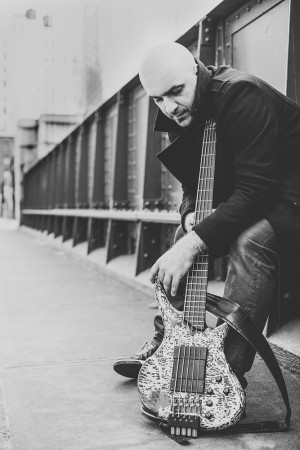 Yeah. That’s my recommendation to any bass player. Learn folk music because it doesn’t lie. Everything that you know from any academic or classical style from around the world comes from folklore. Period. So if you know the bass, you know everything.
Yeah. That’s my recommendation to any bass player. Learn folk music because it doesn’t lie. Everything that you know from any academic or classical style from around the world comes from folklore. Period. So if you know the bass, you know everything.
…Well, it’s not a rule. I learned salsa the wrong way. I learned timba first because it just happened. It’s more complicated because it’s an evolution of salsa. Then I learned the old stuff and realized, “Oh, I needed to know that. Now I get it.”
But bass-wise, the timba thing, which is strategically placed sparsely groove-oriented notes, I applied it on our Balkan stuff like the old claves that we old have- the 11s and the 7s. Have you ever heard of the New York Gypsy All Stars? If you notice- all the bass lines are that. They are over an odd meter syllabic clave and it’s usually repeated but whatever happens resolves to those notes displaced notes like Cubans do. Bass-wise that was my schtick to mix timba-style bass playing with balkan and middle eastern stuff because thats where it’s contextually very intense and in odd meters. 7 and and 11 are common meters. 13- you’d be surprised but people know it and they dance to it. So I did that and it’s usually a combination of long-short-short-long. You keep that and then you know what you do with the bass lines.
Yeah… 13 is definitely not a common number for most other music. So how did all of this lead you to Now Vs. Now?
At Berklee I listened to Avishi Cohen’s album called Adama. When I was a student at Berklee it was my go to CD for a while. You know how you’ve did that in your life where you melted something? I melted that it was one of those I destroyed – I couldn’t play it anymore. It just so happens that Jason [Lindner] did all the arrangements to that. So I was like who’s this. Honestly I didn’t even know them. I learned a lot from them and I was lucky to be around them. I’m still learning and realizing now being slow, also, and they were very patient with me, too.
So what happens is a went up to meet the guy. When I went to NY it just happened because this Israeli girl called me to sing with her on a couple of songs because I sang in New York for Greek weddings, so I learned to sing. I’m not really good at it but, you know, enough to give me vocabulary. So I sang with this girl. Jason was there in the audience by accident and I was like, “You know, you have no idea how much I really love your music.” So the first time he heard me he heard me as a singer. I got the chance to invite him while I was playing with a legendary Turkish clarinet player named Hüsnü Senlendirici and that was it! From that point on we needed to play.
I knew Mark [Guiliana] before I knew Jason because my roommate was the saxophone player in his earlier project Heernt. We met in a recording studio there and became friends. I told Jason about this guy and we jammed for many years until MeShell Ndegeocello made it a record. And then we learned how to make 27 minute songs into 4 minute songs. That’s how I guess.
You do a lot of vocal stuff. How does that affect your bass playing? Does it change the way you play your bass lines or is that something you don’t think about?
The first reason that I’m using my voice in any way has to do with the fact that I come from a non-bass culture. Which meant that whatever I had to solo growing up there, I had to vocalize to attract attention, I guess. It took me a long time to play bass. It was coming, it was getting there, but I was lucky to play on the styles that I told you. It kind of helped me keep it down, but you know I don’t come from that culture so I stopped fighting after a certain point and I started using it to my benefit I guess.
Now Vs. Now has never been a band that went out to play every arrangement perfectly. I learned that from them: Don’t be in a comfortable space. It’s just what we do. So there’s a lot of stuff on YouTube right now that it is not my favorite, but I don’t regret it or anything I think it’s fine. Now I have a better idea [about vocalizing] and it’s getting better because it comes from so many different angles you know? One comes from insecurity and second it was necessary for me to sing the stuff I was not playing, especially in the Cuban stuff. So I’m sure that I can follow the flow of the subdivision with the cats. I was always a freak about nailing percussion and drums I’m a drummer, I was a freak about wanting to nail it down for a long time. Now I actually don’t do that… now I’m doing the opposite. I’m on the offspeed pitches. Before I was all fastballs and now I’m all knuckleballs.
How did Morning Bound come about?
We got together and played. We messed around with the looper at that time pretty badly and me with no pedals… very basic stuff. We have this thing in common we cannot help it, and that’s that whatever we do the progressive rock thing is there. I chose not to fight it anymore because I told you about all of this folk stuff, but the reality is I started playing bass in a heavy metal band. I got a black bass and wore all black. Every record I owned was stitched on my jacket. I was a huge Metallica freak. I got a little bit into the progressive rock and then I got a gig with the older kids who were playing rock like hard rock and some softer stuff, and then I got a gig playing Motown and that switched to Cuban very quickly. I started playing bass at the age of 16 and by the age of 18 I was playing Cuban stuff.
As a teenager, I was listening to heavy metal, power metal and hard rock. If you don’t come from New York and you come from any other country in the world and you’re my generation that was foreign music. Foreign music was Iron Maiden, Metallica, the legends that’s what we knew. And classic rock. I kind of learned english from the Beatles. That was my first non greek band I listened to. I was a Deep Purple person. I also like Queen a lot. I missed out on Led Zeppelin; I just never listened to it. Many great bands that I didn’t listen to cause I went quickly to bass music.
As a band, we’re learning little by little how to become more arranged and less improvise-y. I’ve been an advocate of that a lot, but we’ve also been learning a lot through the process. We’ve been doing this for two years and have had a good time. We played very little local gigs here and eventually I called Rockwood and hooked it up so we played a better audience. We just had a cd release two days ago and it was amazing. A lot of people came. We still sound geeky! My friend Jojo Mayer came to see us and said, “Yeah, you sound geeky, but you have to make a decision about who you want to play for.” You could say the same thing about Now Vs. Now I guess. We don’t play for the masses; we do what we like, I guess. We’re learning. Tammy is becoming amazing with the looper. I have a lot of effects to work with now. Ronen keeps the jazziness, and we’re just getting our thing.
Where did you come up with the “Morning Bound” riff?
Actually, that riff is Ronen’s composition. I’m playing exactly what he wanted, and kudos to him because I don’t think it could get any better. Sometimes it’s so great when other players compose for you. It’s funny, because he’s predominately a very open jazz player. The rest of the arrangements are all of us together.
In this band, I had to put myself in a situation where I had to do things I’ve never done before. I know how to play chords, and [using them more in Morning Bound] helps me to learn my fingerboard even more. Now I know how to use effects more. I never tapped before… I didn’t have to deal with it. But now I do because I use it in a comping setting. I’m applying all these things to become the harmony and the bass at the same time. I’m getting better at it all the time.
Tell me about your bass.
Well, I’ve been seen with two basses. I always play headless basses. The one I’m seen the most in YouTube videos is custom made by Odyssey Basses, which is why I started playing headless. It’s a 5-string with a 34-inch scale. It has two soapbar humbuckers and a custom made preamp. It’s neck is very narrow, and the body is covered in a metallic oxidation. It has tons of punch so it was perfect for playing timba.

